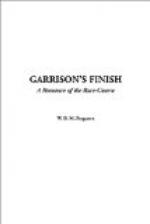“You’ll admit it looks somewhat like you,” said Sue, with great dryness.
Garrison studied it long and carefully. “Yes—I do,” he murmured, in a perplexed tone. “A double. Funny, isn’t it? Where did you get it?” She laughed a little, flushing.
“I was silly enough to think you were one and the same, and that you wished to conceal your identity from your relatives. So I made occasion to steal it from the book your aunt was about to read. Remember? It was the leaf she thought the major had abstracted.”
“I must thank you for your kindness, even though it went astray. May I have it?”
“Ye-es. And you are sure you are not the original?”
“I haven’t the slightest recollection of being Billy Garrison,” reiterated Billy Garrison, wearily and truthfully.
The ride home was mostly one of silence. Both were thinking. As they came within sight of Calvert House the girl turned to him:
“There is one thing you can do—ride. Like glory. Where did you more than learn?”
“Must have been born with me.”
“What’s bred in the bone will come out in the blood,” she quoted enigmatically. She was smiling in a way that made Garrison vaguely uncomfortable.
CHAPTER VII.
Snark shows his fangs.
Alone in his room that night Garrison endeavored to focus the stray thoughts, suspicions that the day’s events had set running through his brain. All Sue Desha had said, and had meant without saying, had been photographed on the sensitized plate of his memory—that plate on which the negatives of the past were but filmy shadows. Now, of them all, the same Garrison was on the sky-line of his imagination.
Could it be possible that Billy Garrison and he were one and the same? And then that incident of the train. Surely he had heard it before, somewhere in the misty long ago. It seemed, too, as if it had occurred coincidently with the moment he had first looked into those gray eyes. He laughed nervously to himself.
“If I was Garrison, whoever he was, I wonder what kind of a person I was! They speak of him as if he had been some one—And then Mrs. Calvert said he had disappeared. Perhaps I am Garrison.”
Nervously he brought forth the page from the race-track annual Sue had given him, and studied it intently. “Yes, it does look like me. But it may be only a double; a coincidence.” He racked his brain for a stray gleam of retrospect, but it was not forthcoming. “It’s no use,” he sighed wearily, “my life began when I left the hospital. And if I was Garrison, surely I would have been recognized by some one in New York.
“Hold on,” he added eagerly, “I remember the first day I was out a man caught me by the arm on Broadway and said: ‘Hello, Billy!’ Let me think. This Garrison’s name was Billy. The initials on my underwear were W. G.—might be William Garrison instead of the William Good I took. But if so, how did I come to be in the hospital without a friend in the world? The doctors knew nothing of me. Haven’t I any parents or relatives—real relatives, not the ones I am imposing on?”




